Published Sep 26, 2025 | 9:00 AM ⚊ Updated Oct 17, 2025 | 11:27 AM
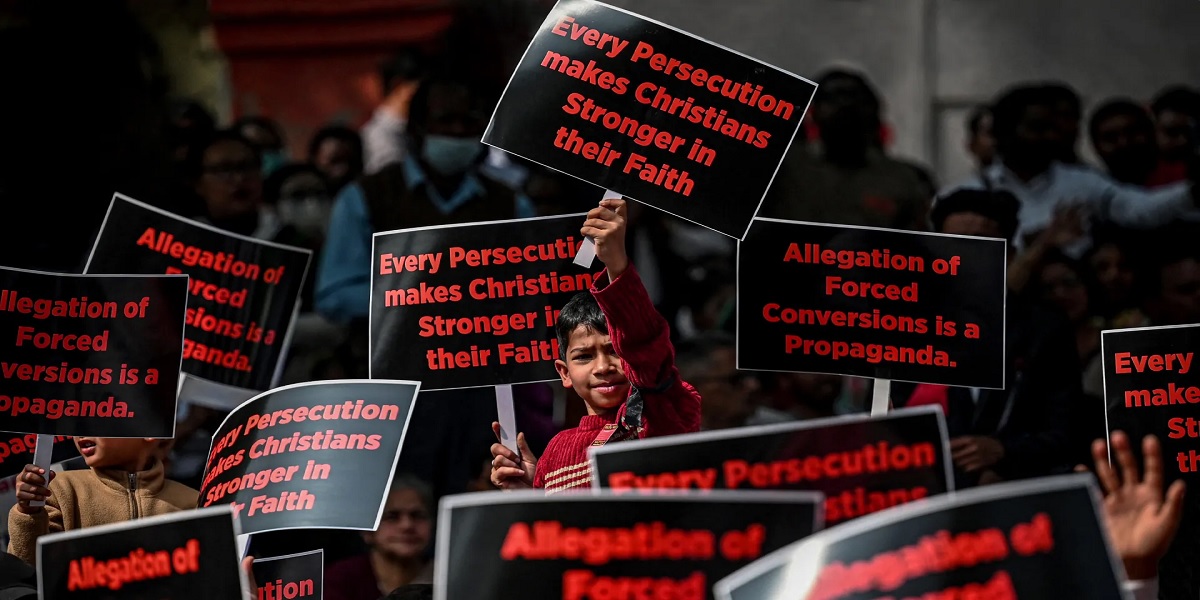
Malayali Christian community in Durg, once so rooted and secure, now lives under the threatening shadow of Sangh Parivar forces, especially the Bajrang Dal.
Synopsis: Once the land of opportunity and peace, life in Chhattisgarh has turned nightmarish for Malayalis, especially Christians. Hindutva forces are targeting them, with the blessings of those responsible for protecting them, and the Indian Constitution. Beyond the obvious communal angle attributed to the growing attacks on Christians lies the real reason: the empowerment of Dalits.
In September 2019, Thiruvananthapuram MP Shashi Tharoor made a rare blooper. In response to the much-hyped ‘Howdy Modi’ event in Texas, US, the suave parliamentarian posted a “forwarded” photograph on his Twitter (now, X) handle, showing the rousing welcome Jawaharlal Nehru had received without any PR work on a foreign visit.
“Nehru & India Gandhi [sic] in the US in 1954. Look at the hugely enthusiastic spontaneous turnout of the American public, without any special PR campaign, NRI crowd management, or hyped-up media publicity,” he tweeted, oblivious of the three apparent mistakes he was committing.
Netizens and fact-checkers went on an overdrive on seeing Tharoor misspelling Indira. They went further and dug up more information, which forced the Lok Sabha member to tweet a clarification.
Fact-checkers found that the photograph was taken during Nehru’s visit to the USSR, and not the US. They also claimed that the year was 1955.
In 1955, a little boy from Kerala, unaware of Nehru’s visit to the USSR’s Magnitogorsk, a geographical anomaly that once consisted almost entirely of iron ore. The boy frolicked with friends on the banks of the River Pampa, now in Kerala’s Pathanamthitta district.
Little did he then know that Nehru’s visit to the Soviet Union would soon take him to Durg, now in Chhattisgarh.
On 2 March 1955, the USSR and India signed an agreement for an integrated iron and steel works in Bhilai, the twin city of Durg, then in Madhya Pradesh. Three years later, the first furnace roared into life.
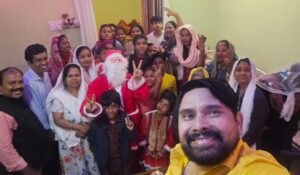
Believers celebrating Christmas in a house prayer congregation
The Bhilai Steel Plant (BSP) opened up employment opportunities to several skilled and unskilled workers in Tamil Nadu and Kerala. The boy’s father was among those who grabbed the opportunity, and his family shifted from the banks of Pampa to the shores of the Shivnath River, now called a jewel of Chhattisgarh.
From Kerala, it was mostly people from central Travancore who went to Bhilai. Having gained the gift of education through the Church Mission Society missionaries, they were prepared for such new opportunities, even when Kerala itself had no industries to speak of.
For decades, they lived in the twin cities of Bhilai and Durg, proud contributors to India’s growth story. Their generations grew up there, chose to stay, and built peaceful lives.
Today, that peace is frayed.
The boy — now all grown up — whose father was an engineer at BSP, now lives in fear because of his Christian identity. They cannot even whisper ‘Hallelujah’ within their four walls.
Yes, the Malayali Christian community in Durg, once so rooted and secure, now lives under the shadow of Sangh Parivar forces, especially the Bajrang Dal.
In Raipur, Durg, and the surrounding areas of Chhattisgarh, an unofficial directive to close house-churches is reportedly being enforced. These house-churches, mainly run by Pentecostal pastors, are small congregations that meet in private homes rather than formal church buildings.
According to a June 2025 ruling by the Madras High Court, private homes in India can generally be used for religious prayer. However, converting a house into a permanent place of worship requires permission from local authorities.
”In Durg, there are fewer than 10 Malayali pastors, but the Christian community is strong, comprising nearly 5,000 families—from Orthodox, Latin Catholic, and Pentecostal denominations such as IPC and Church of God, etc.,” a church council leader from Durg with roots in Kottarakkara, Kollam, told South First.
“Most Malayali pastors have registered churches, but some face financial constraints that prevent them from building formal church buildings. So they conduct prayers in their homes,” he said on condition of anonymity.
In Bhilai, the plant authorities had allocated acres of land for Christians on lease to build churches. With nearly 30,000 permanent workers in BSP, people from South India, Bengal, and elsewhere were free to live here and practice their faith.
Alongside schools and hospitals, religious institutions like churches, mosques, and temples were established. The Orthodox Diocese later built numerous schools, colleges, and professional institutions, while Catholics set up hospitals and schools in Durg.
Now, after Vishnu Deo Sai became the Chief Minister of Chhattisgarh, Bajrang Dal members are being forced to stop house prayer meetings.
“They come to our prayer centres with police, attack us, and shut down our churches. Police then file cases against pastors for ‘shanti bhang‘ (disturbing peace) and Section 295 (hurting religious sentiments) at the request of Bajrang Dal members. After the arrest of two Malayali nuns, the confidence of Bajrang Dal activists has increased, as the police have not taken action against them,” the church leader said.
After Bajrang Dal allegedly began shutting down house congregations and prayer meetings through threats and violence, church authorities approached the High Court.
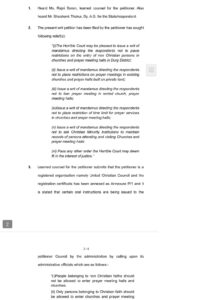
Copy of the High Court order.
The Chhattisgarh High Court has directed the Durg District administration to consider representations from the United Christian Council regarding restrictions on prayer meetings in churches and halls.
The petition, filed by the council’s Secretary Obed Das, sought relief against several restrictions, including barring non-Christians, banning prayers in residential or rented halls, limiting prayer duration, and recording attendees.
“The administration has been issuing oral instructions restricting who can attend prayer meetings and where they can be held, despite churches being on private land,” a lawyer, who also sought anonymity, told South First.
The court ordered the District Magistrate to decide the representations submitted on 6 April and 31 July 2024, after a fair hearing within four weeks. The petition was disposed of with directions to pass an appropriate order.
However, the local administration has yet to act. ”Till now, no action has been taken even after the High Court’s direction. So where will we go for justice?” the church leader asked.
Article 25 of the Indian Constitution guarantees freedom of conscience and the right to freely practice, profess, and propagate religion. In practice, however, this right is under strain in Chhattisgarh.
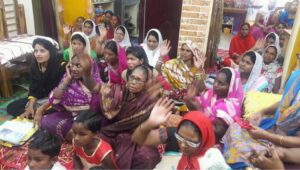
A house prayer in session in Durg.
Christians make up less than 2% of Chhattisgarh’s population of around 30 million. Yet, the state has witnessed alarming incidents targeting the community.
Between January and July 2025, 86 cases of systematic targeting of Christians were reported by the Evangelical Fellowship of India’s Religious Liberty Commission, which is the second highest among Indian states, after Uttar Pradesh.
Last year, Chhattisgarh recorded 165 anti-Christian incidents, many involving mobs storming house churches during or after Sunday prayers, often led by vigilantes associated with Bajrang Dal and VHP.
Arun Pannalal, President of the Chhattisgarh Christian Forum, told South First that around 70 percent of the state’s pastors are from Kerala.
“On 14 August, police in Raipur held a meeting with nearly 400 pastors, instructing us to stop all house church activities until they obtained permission from the district collector. Subsequently, at least one church received an official notice citing the 1984 Act and ordering its closure. In many cases, old orders passed during the COVID-19 pandemic were cited, despite being irrelevant in 2022 and beyond,” he said.
Pannalal highlighted that private prayer meetings involved only close community members, yet vigilantes from groups like the Bajrang Dal entered private homes, claiming alleged conversions, with police often stating they are powerless due to ”political pressure”.
Tensions around house-churches and small prayer gatherings have arisen, with district officials summoning participants along with members of the Bajrang Dal. Authorities cited the Chhattisgarh Sarvajanik Dharmik Bhawan Tatha Sthan Viniyaman Adhiniyam, 1984, which regulates the construction of public religious buildings and the use of public spaces for religious purposes.
A more stringent law to curb religious conversions is reportedly also being drafted. Experts and religious leaders, however, have questioned the validity of the 1984 Act, which predates the formation of Chhattisgarh itself.
”The most concerning thing is that no authority is willing to put anything on paper,” Pannalal said.
On 18 September, the Bhim Army organised a rally in support of Christians, which was stopped by a Hindutva mob. Dinesh Azaad, a Bhim Army leader, emphasised the importance of protecting minority rights.
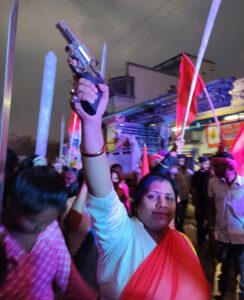
Jyoti Sharma, Bajrang Dal leader, brandishing a firearm.
Another person, on condition of anonymity, told South First that Jyoti Sharma, a female Bajrang Dal leader with a three-year-old non-bailable FIR, has been absconding.
Despite a High Court warrant, she remains free and actively leads attacks against Christians. Recently, she and her team targeted Malayali nuns and the president of the United Christian Council, pressuring police to file cases against them.
Pannalal highlighted that the Sangh Parivar fears the empowerment of Dalits and the spread of education among tribal and poor communities. In Chhattisgarh, in the name of merging schools under NEP provisions, many schools have already been shut.
The aim appears to be limiting access to education, while the Christian community continues to provide education and uplift lives—a development seen as threatening by extremists.
The migrants, who once built lives around Bhilai Steel Plant and gave the state schools and hospitals, now live in fear, targeted for their faith in a country that calls itself secular.
(Edited by Majnu Babu).

